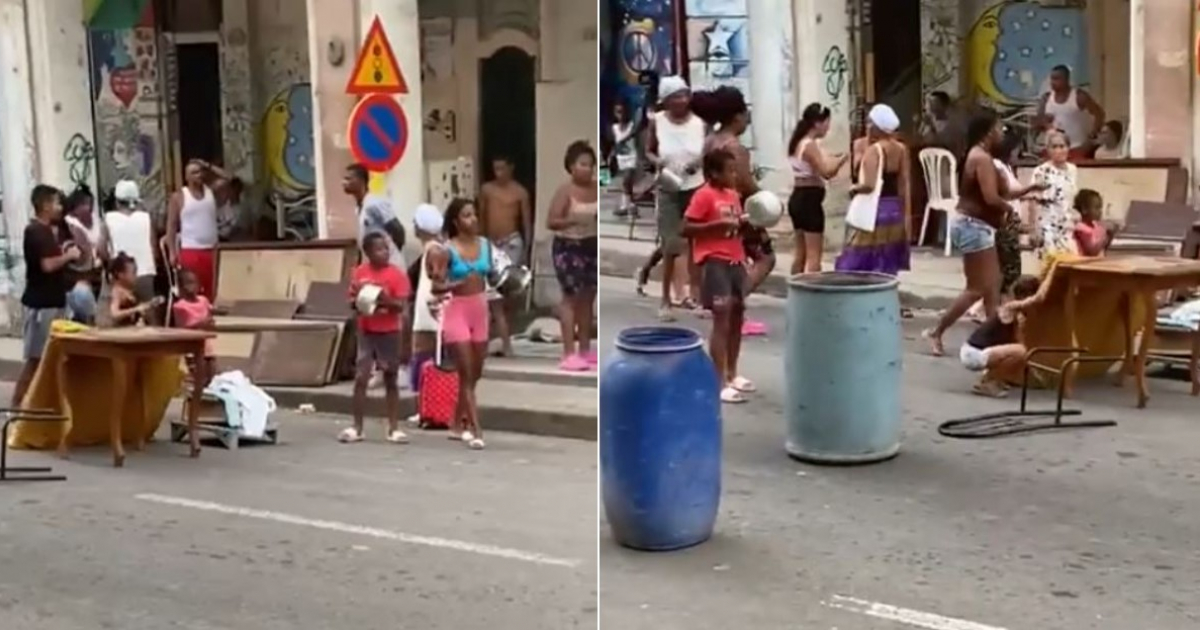This Tuesday, a group of residents blocked Havana’s famous Paseo del Prado, placing furniture and water tanks as a barrier and They protested by banging potsamidst a strong presence of men in military uniform and oppressive civilians.
“Yes, there was a protest in the Prado,” said V Facebook Cuban activist Adeleth Bonnie Gamboaconfirming the information that was initially circulated through social networking sites, amid the disbelief and surprise of many users.
A video clip circulating on social media showed a group of residents of the area with their furniture on the street blocking the road for vehicles on Paseo del Prado. Protesters banged on their sinks in a protest the causes of which, at the time of writing, were not known.
“This photo was taken in the area just 5 minutes ago, where the street was blocked by a group of people, who told me they were residents of the same block, and blocked one of Havana’s famous Paseo del Prado streets with belongings and circular cauldrons,” Bon Gamboa explained.
In his post, the activist indicated a “strong presence of police and state security personnel in civilian clothes” in the area, as evidenced by the aforementioned outlet’s video.
“It is highlighted that this is happening in one of the most central areas of the capital,” Bon Gamboa said, noting that the protest was taking place in the Prado and Virtudis.
An hour after it was published confirming the facts, the activist lamented that the internet connection on his phone had begun to fail.
“I am publishing this post because I feel bad energy in the environment… and I have a feeling that the internet outage will affect me down the road. If that happens to me, I hold the Cuban dictatorship responsible… Reporting is not a crime,” he said.
The internet shutdown is part of the regime’s strategy to silence emerging sources of protest in Cuba as quickly as possible, as demonstrated on multiple occasions after the community outbreak on July 11, 2021.
One of the most important events of this state security tactic, in collusion with ETECSA – the state company controlled by the regime and monopoly on communications in Cuba – occurred in October 2022, when hundreds of Havanese took to the streets to Protest against power outages and the incompetence of the authorities To solve the breakdown of the national electrical system.
At the end of last April, Cuban pastor Alberto ReyesPriest of the parish of Esmeralda, Camaguey, confirmed this Another protest like the historic events of 9/11 is just around the cornerBecause “the people are fed up.”
After nearly two years of massive rallies on July 11, 2021, others of this magnitude are “just around the corner,” he predicted to the agency. EFE A subtle connoisseur of the “Cuban parish” and a clear commentator of Cuban reality.
Just three days ago Tag “NO TO THE PCC” Dawn Books is housed in Humboldt Building 7 in Havana. El Nuevo Directorio (END), a self-declared nonviolent movement against the Cuban regime, has claimed to be the author of the latest graffiti to appear in Cuba.
After the writer’s arrest It was Jorge Fernandez At the beginning of April, the Cuban historian Alina Barbara Lopez Hernandez It was instigated by government authorities, party and state security officials So do not demonstrate peacefully in Matanzas.
Citizen participation, food and public health are at the heart of Cubans’ discontent with the government of Miguel Diaz-Canel and moved the will of hundreds of Cubans who staged more than 300 protests on the island in March, according to the Conflict Monitor. (OCC) in a report Monthly on protest demonstrations in Cuba.
Hunger was one of the biggest triggers for the protests that monthAlong with civil society’s refusal to participate in the March 26 elections, it was manifested in the abstention campaign promoted by Cuban activists.

“Music buff. Social media lover. Web specialist. Analyst. Organizer. Travel trailblazer.”







More Stories
Nicaragua picks up and delivers to El Salvador four subjects circulated by Interpol
UN experts have warned of serious human rights violations in the context of the presidential elections scheduled for July 28 in Venezuela.
The Organization of American States deploys observers for the US elections